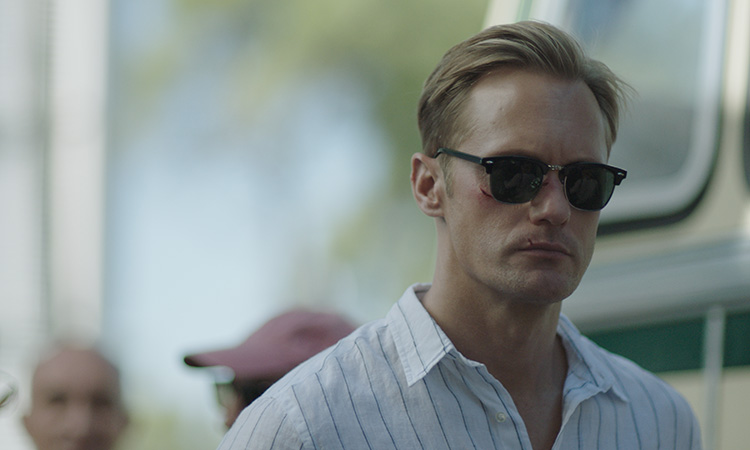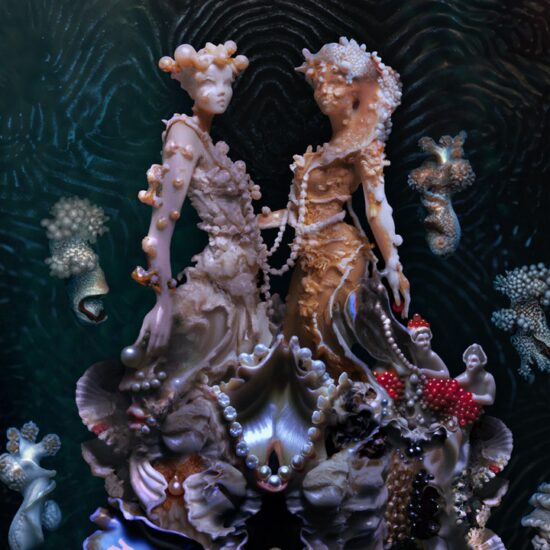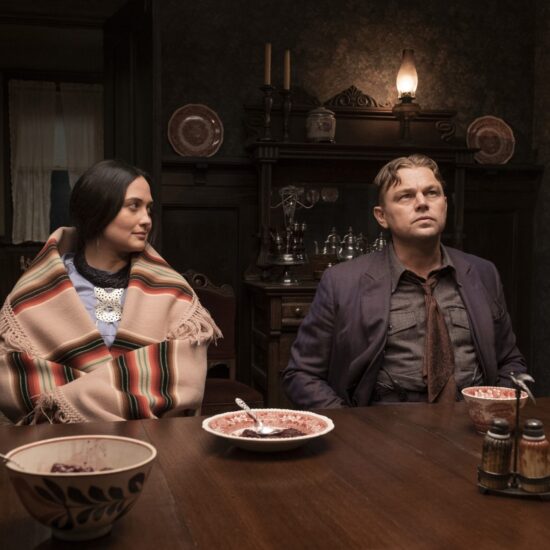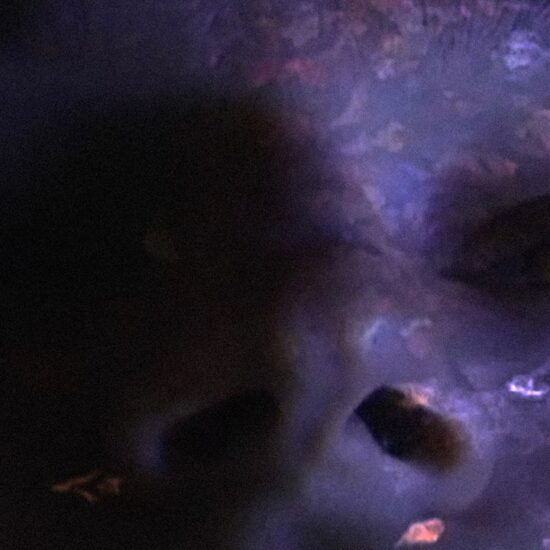
Infinity Pool begins in the dark. Novelist James Foster (Alexander Skarsgård) has just muttered something creepily nonsensical in his sleep, and his wife Em (Cleopatra Coleman) asks for clarification on what his unconscious was trying to say. James is in a liminal state, between sleep and wakefulness – and at several later points in the film, we will see him again regaining his consciousness and reopening his bleary eyes. James is also located in a liminal interzone, at a luxury resort on the edge of the infinite ocean, protected from storms by the season, and from the island beyond by a huge guarded gate with barbed wire at the top. Within that perimeter, packaged inauthenticity rules – there is even a fake town here with its own Chinese restaurant to provide, as the resort booklet says, ‘an international dining experience’. Meanwhile, group activities involve dressing up in the facial pigments and grotesque ‘Aki’ masks of the locals, without ever really getting near the people themselves except as servants and staff. Amid all this hermetic artifice, sealed from the harsher realities of the world beyond, James and Em will wonder aloud more than once if they are dreaming.
The resort is on the fictional island of Li Tolqa, whose impoverished, aggrieved populace have their own language and alphabet, their own system of harsh justice, and even a unique technology (called ‘doubling’). James and Em will come to experience all this after meeting the seductive sociopath Gabi Bauer (Mia Goth) and her architect husband Alban (Jalil Lespert), and venturing with them beyond the bounds for a day outing that turns into a nightmare.
Now a criminal with a guilty conscience, James discovers that despite facing execution for his inadvertent actions, in this place there is a way, available for monied tourists, to cheat death while satisfying local anger – and that the Bauers and a small group of their friends have been using these second, third, fourth, perhaps infinite chances to behave with impunity (payment aside) and to live out their fantasies without consequence – at least for themselves.
As James is initiated into this clique of decadent thrill seekers, with their drug-taking rituals and orgies of unscrupulous excess and entitlement, he realises he is either a pawn in their cruel game, or perhaps just a man on a mystic journey to discover himself, to confront the beast within, and to emerge as a different person, forever transformed by his experience. So just like any vacation, really.
There are multiple ways that James’ bloody, eye-opening ordeal might be interpreted. On the one hand, it is a class satire, akin to Agnieszka Woszczynska’s Silent Land (2021), Mark Mylod’s The Menu (2022) or Ruben Östlund’s Triangle of Sadness (2022), revealing the casually cruel colonial privilege of the haves and the vindictive indignation of the have-nots. On the other, it may just be James’ nightmare – his deepest, darkest fears and desires – vividly realised on screen while he in fact sleeps at his wife’s side, mumbling incoherences. As Karim Hussain’s camera either hugs its subjects tight and close or queasily spins around them, all the Bava-esque lighting and hellish, hallucinatory sequences bring James’ innermost anxieties to the surface.
Or perhaps this is all a representation of James’ creative process as a writer, with its duplications (whether near-exact or utterly distorted) of reality, its rigorous, recriminatory self-examination and self-criticism, its masquerades and assimilations of otherness, and its testing and transgression of permitted boundaries. After all, James has been blocked for six years and came with Em to the resort expressly to seek inspiration for his lost craft. As he wrestles with both his errant ideas and with himself (literally, in later sequences), all Infinity Pool‘s most surreally horrific scenarios may just be figurations of his mind’s working as he sits on the resort’s beach, facing the infinite ocean, and tries to plot out that elusive second novel. For it is possible that here, as in Joel Coen’s Barton Fink (1991), François Ozon’s (similarly titled) Swimming Pool (2003) and Lawrence Michael Levine’s Black Bear (2020), what we are seeing is a writer’s attempt to extract the semblance of an interesting, inventive story from the most sterile and uninspiring of surroundings.
Any way you read it, though, this is a wild infernal trip into a twisted psyche or two. For much as, when Gabi asks Em why she would ever marry a man like James, James quips that his wife has ‘daddy issues’, James has issues of his own (more of the mummy than daddy variety), and will work through them in a manner all at once deviant, hyperviolent and humiliatingly cathartic. With Anti-Viral (2012), Possessor (2020) and now this Ballardian chiller in his filmography, writer/director Brandon Cronenberg has forged an unholy trinity of low-key science fiction, in which humanity at its most appetitive and alienated is exposed to the elements.
Infinity Pool is visceral and confronting, but once its waves of shock have receded, it is the richly perverse ideas that will linger, buffeting the brain with their endless ripples. It is well worth the deep dive.
Infinity Pool will be in cinemas on 24 March














